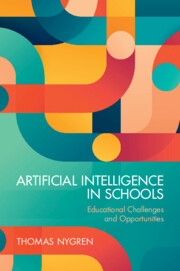Refine search
Actions for selected content:
68 results
14 - Some Truths About Lies
- from Part III - Policy Responses
-
-
- Book:
- Securing Democracies
- Published online:
- 19 December 2025
- Print publication:
- 22 January 2026, pp 321-344
-
- Chapter
-
- You have access
- Open access
- HTML
- Export citation
7 - Claims to Understanding
-
- Book:
- Explanation and Critical Thinking in the Neurosciences
- Published online:
- 17 December 2025
- Print publication:
- 22 January 2026, pp 146-173
-
- Chapter
- Export citation
3 - Logical Fallacies
-
- Book:
- Explanation and Critical Thinking in the Neurosciences
- Published online:
- 17 December 2025
- Print publication:
- 22 January 2026, pp 44-96
-
- Chapter
- Export citation

Artificial Intelligence in Schools
- Educational Challenges and Opportunities
-
- Published online:
- 24 December 2025
- Print publication:
- 30 October 2025

Explanation and Critical Thinking in the Neurosciences
- Bridging the Gaps
-
- Published online:
- 17 December 2025
- Print publication:
- 22 January 2026
-
- Textbook
- Export citation
Chapter 62 - Critical Processing of Beauty Images Scale (CPBI)
-
-
- Book:
- Handbook of Body Image-Related Measures
- Published online:
- 21 November 2025
- Print publication:
- 20 November 2025, pp 192-194
-
- Chapter
- Export citation
6 - The Human Advantage
-
- Book:
- Artificial Intelligence in Schools
- Published online:
- 24 December 2025
- Print publication:
- 30 October 2025, pp 149-159
-
- Chapter
- Export citation
Introduction
-
- Book:
- Artificial Intelligence in Schools
- Published online:
- 24 December 2025
- Print publication:
- 30 October 2025, pp 1-3
-
- Chapter
- Export citation
18 - Critical thinking and decision-making
- from Part 4 - Achieves Outcomes
-
-
- Book:
- Leading and Managing Health Services
- Published online:
- 15 August 2025
- Print publication:
- 28 August 2025, pp 200-209
-
- Chapter
- Export citation
Chapter 8 - Making Geography come alive by teaching geographical thinking
- from Part II - HASS concepts and sub-strands
-
-
- Book:
- Making Humanities and Social Sciences Come Alive
- Published online:
- 02 August 2025
- Print publication:
- 14 August 2025, pp 134-154
-
- Chapter
- Export citation
Chapter 26 - Libraries and librarians: At home with HASS
- from Part VI - Community and global connections
-
-
- Book:
- Making Humanities and Social Sciences Come Alive
- Published online:
- 02 August 2025
- Print publication:
- 14 August 2025, pp 440-453
-
- Chapter
- Export citation
Speculative Documentary as World-Building: Contaminated Knowledge and Future-Making
-
- Journal:
- Australian Journal of Environmental Education / Volume 41 / Issue 3 / July 2025
- Published online by Cambridge University Press:
- 07 August 2025, pp. 708-718
-
- Article
-
- You have access
- Open access
- HTML
- Export citation
Introduction
-
- Book:
- Understanding Technology and Society
- Published online:
- 30 September 2025
- Print publication:
- 10 July 2025, pp 1-4
-
- Chapter
- Export citation
14 - Social Interaction and Learning
- from Part IV - Social Aspects
-
-
- Book:
- The Cambridge Handbook of Technology in Language Teaching and Learning
- Published online:
- 15 June 2025
- Print publication:
- 26 June 2025, pp 233-247
-
- Chapter
- Export citation
12 - Bringing it together
- from Part 6 - Decision-making
-
- Book:
- Introduction to Epidemiology for the Health Sciences
- Published online:
- 28 May 2025
- Print publication:
- 24 April 2025, pp 348-379
-
- Chapter
- Export citation
1 - Thinking critically, problem-solving and setting priorities in epidemiology
- from Part 1 - Thinking like an epidemiologist
-
- Book:
- Introduction to Epidemiology for the Health Sciences
- Published online:
- 28 May 2025
- Print publication:
- 24 April 2025, pp 2-32
-
- Chapter
- Export citation
Chapter 12 - A Heuristic Exploration into the Social and Emotional Intelligences
-
- Book:
- Essentials of Social and Emotional Intelligences
- Published online:
- 25 March 2025
- Print publication:
- 27 March 2025, pp 261-270
-
- Chapter
- Export citation
Chapter 5 - What Does History Teach Us?
-
- Book:
- Teaching History in Higher Education
- Published online:
- 07 February 2025
- Print publication:
- 20 February 2025, pp 183-214
-
- Chapter
- Export citation
Introduction
-
- Book:
- Teaching History in Higher Education
- Published online:
- 07 February 2025
- Print publication:
- 20 February 2025, pp 1-23
-
- Chapter
- Export citation
Chapter 1 - Exploring communication and decision-making
- from Part 1 - Understanding communication
-
- Book:
- Communication Skills for Business Professionals
- Published online:
- 25 February 2025
- Print publication:
- 15 January 2025, pp 2-24
-
- Chapter
- Export citation
